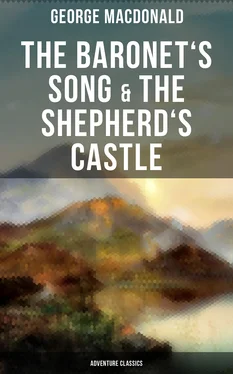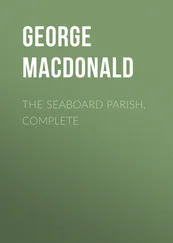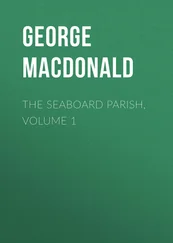He saw nothing so frightful as he had, in spite of himself, anticipated, but was not therefore, perhaps, the less astonished. The dread brownie of his idea shrunk to a tiny ragged urchin, with a wonderful head of hair, azure eyes, and deft hands, noiselessly bustling about on bare feet. He watched him at his leisure, watched him keenly, assured that any moment he could spring upon him.
As he watched, his wonder sank, and he grew disappointed at the collapsing of the lubber-fiend into a poor half-naked child upon whom both his courage and his fear had been wasted. As he continued to watch, an evil cloud of anger at the presumption of the unknown minimus began to gather in his mental atmosphere, and was probably the cause of some movement by which his chair gave a loud creak. Without even looking round, Gibbie darted into the dairy, and shut the door. Instantly Fergus was after him, but only in time to see the vanishing of his last heel through the hole in the wall, and that way Fergus was much too large to follow him. He rushed from the house, and across the corner of the yard to the barn-door. Gibbie, who did not believe he had been seen, stood laughing on the floor, when suddenly he heard the key entering the lock. He bolted through the cat-hole—but again just one moment too late, leaving behind him on Fergus's retina the light from the soles of two bare feet. The key of the door to the rick-yard was inside, and Fergus was after him in a moment, but the ricks came close to the barn-door, and the next he saw of him was the fluttering of his rags in the wind, and the flashing of his white skin in the sun, as he fled across the clover field; and before Fergus was over the wall, Gibbie was a good way ahead towards the Lorrie. Gibbie was a better runner for his size than Fergus, and in better training too; but, alas! Fergus's legs were nearly twice as long as Gibbie's. The little one reached the Lorrie, first, and dashing across it, ran up the side of the Glashburn, with a vague idea of Glashgar in his head. Fergus behind him was growing more and more angry as he gained upon him but felt his breath failing him. Just at the bridge to the iron gate to Glashruach, he caught him at last, and sunk on the parapet exhausted. The smile with which Gibbie, too much out of breath to laugh, confessed himself vanquished, would have disarmed one harder-hearted than Fergus, had he not lost his temper in the dread of losing his labour; and the answer Gibbie received to his smile was a box on the ear that bewildered him. He looked pitifully in his captor's face, the smile not yet faded from his, only to receive a box on the other ear, which, though a contrary and similar both at once, was not a cure, and the water gathered in his eyes. Fergus, a little eased in his temper by the infliction, and in his breath by the wall of the bridge, began to ply him with questions; but no answer following, his wrath rose again, and again he boxed both his ears—without better result.
Then came the question what was he to do with the redoubted brownie, now that he had him. He was ashamed to show himself as the captor of such a miserable culprit, but the little rascal deserved punishment, and the laird would require him at his hands. He turned upon his prisoner and told him he was an impudent rascal. Gibbie had recovered again, and was able once more to smile a little. He had been guilty of burglary, said Fergus; and Gibbie smiled. He could be sent to prison for it, said Fergus; and Gibbie smiled—but this time a very grave smile. Fergus took him by the collar, which amounted to nearly a third part of the jacket, and shook him till he had half torn that third from the other two; then opened the gate, and, holding him by the back of the neck, walked him up the drive, every now and then giving him a fierce shake that jarred his teeth. Thus, over the old gravel, mossy and damp and grassy, and cool to his little bare feet, between rowan and birk and pine and larch, like a malefactor, and looking every inch the outcast he was, did Sir Gilbert Galbraith approach the house of his ancestors for the first time. Individually, wee Gibbie was anything but a prodigal; it had never been possible to him to be one; but none the less was he the type and result and representative of his prodigal race, in him now once more looking upon the house they had lost by their vices and weaknesses, and in him now beginning to reap the benefits of punishment. But of vice and loss, of house and fathers and punishment, Gibbie had no smallest cognition. His history was about him and in him, yet of it all he suspected nothing. It would have made little difference to him if he had known it all; he would none the less have accepted everything that came, just as part of the story in which he found himself.
CHAPTER XXI.
THE PUNISHMENT.
Table of Contents
The house he was approaching, had a little the look of a prison. Of the more ancient portion the windows were very small, and every corner had a turret with a conical cap-roof. That part was all rough-cast, therefore grey, as if with age. The more modern part was built of all kinds of hard stone, roughly cloven or blasted from the mountain and its boulders. Granite red and grey, blue whinstone, yellow ironstone, were all mingled anyhow, fitness of size and shape alone regarded in their conjunctions; but the result as to colour was rather pleasing than otherwise, and Gibbie regarded it with some admiration. Nor, although he had received from Fergus such convincing proof that he was regarded as a culprit, had he any dread of evil awaiting him. The highest embodiment of the law with which he had acquaintance was the police, and from not one of them in all the city had he ever had a harsh word; his conscience was as void of offence as ever it had been, and the law consequently, notwithstanding the threats of Fergus, had for him no terrors.
The laird was an early riser, and therefore regarded the mere getting up early as a virtue, altogether irrespective of how the time, thus redeemed, as he called it, was spent. This morning, as it turned out, it would have been better spent in sleep. He was talking to his gamekeeper, a heavy-browed man, by the coach-house door, when Fergus appeared holding the dwindled brownie by the huge collar of his tatters. A more innocent-looking malefactor sure never appeared before awful Justice! Only he was in rags, and there are others besides dogs whose judgments go by appearance. Mr. Galbraith was one of them, and smiled a grim, an ugly smile.
"So this is your vaunted brownie, Mr. Duff!" he said, and stood looking down upon Gibbie, as if in his small person he saw superstition at the point of death, mocked thither by the arrows of his contemptuous wit.
"It's all the brownie I could lay hands on, sir," answered Fergus. "I took him in the act."
"Boy," said the laird, rolling his eyes, more unsteady than usual with indignation, in the direction of Gibbie, "what have you to say for yourself?"
Gibbie had no say—and nothing to say that his questioner could either have understood or believed; the truth from his lips would but have presented him a lying hypocrite to the wisdom of his judge. As it was, he smiled, looking up fearless in the face of the magistrate, so awful in his own esteem.
"What is your name?" asked the laird, speaking yet more sternly.
Gibbie still smiled and was silent, looking straight in his questioner's eyes. He dreaded nothing from the laird. Fergus had beaten him, but Fergus he classed with the bigger boys who had occasionally treated him roughly; this was a man, and men, except they were foreign sailors, or drunk, were never unkind. He had no idea of his silence causing annoyance. Everybody in the city had known he could not answer; and now when Fergus and the laird persisted in questioning him, he thought they were making kindly game of him, and smiled the more. Nor was there much about Mr. Galbraith to rouse a suspicion of the contrary; for he made a great virtue of keeping his temper when most he caused other people to lose theirs.
Читать дальше












